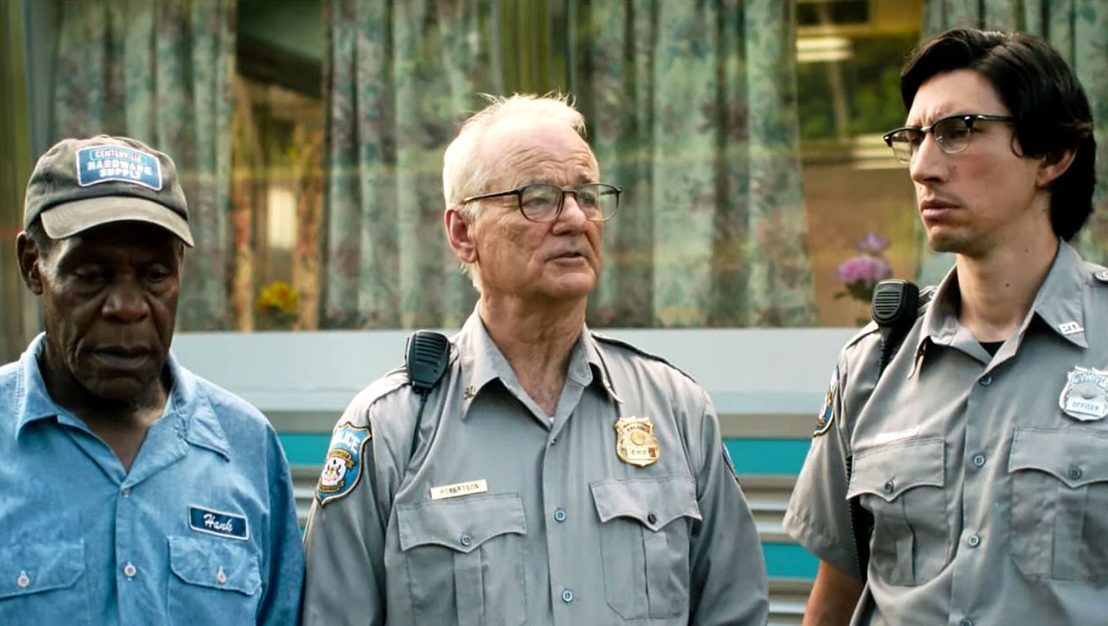Tin Can is the best kind of sci-fi, an equal mix of weirdo ideas and careful world-building that leads viewers to a genuinely unsettling conclusion.
The new dystopian sci-fi feature Tin Can appears at first blush to be a perfect example of a Covid production — a small cast that spends much of the time isolated from one another; sparse, minimal location work, and a general lo-fi approach to costume design and special effects. So it’s somewhat surprising to discover that the film was completed and played festivals in 2020; it’s accidentally prescient, very much of this specific, peculiar moment, with fear and distrust and confusion commingling into a potent stew of extremely bad vibes. Co-writer/director Seth A. Smith has pulled off the remarkable feat of turning a low budget and limited means into a virtue rather than a hindrance, allowing his characters’ disorientation to seep in to and infect the film’s very structure. It’s a DIY mindfuck by way of Cronenberg and Tsukamoto.
After a brief prologue, in which we hear a man bidding farewell to his partner via voiceover narration as a local news report describes an ongoing plague referred to only as “coral,” we are introduced to a scientist named Fret (Anna Hopkins). She’s made some kind of breakthrough while studying this virus, something about keeping it from bonding with a host, and is excited to share her discovery. This could be the key to a cure, or at least a treatment. But before she can tell anyone about her findings, she’s attacked by an off-screen assailant and the screen goes black. A title card appears, and suddenly Fret wakes up alone inside a dark, tiny, self-enclosed pod. It’s a jolting pivot, the camera suddenly pinned inside these intensely cramped quarters and capturing only fragments of Felt’s POV. Smith takes great pains to emphasize every aspect of Fret’s agonizing ordeal; her first course of action is regaining consciousness and figuring out where exactly she is. Like a bio-mechanical nightmare, every part of her is connected to some sort of automated device; a squirm-inducing sequence finds her removing a catheter, feeding tubes, IVs, and the like. This section of the film moves deliberately, almost in real time, as Felt contemplates each step she must take while trying not to lose her mind. She’s surrounded by blinking lights and electronics and tries frantically to scream for help.
Eventually, she hears a voice, and the plot thickens, as they say. Somehow, Fret’s ex-husband, John (Simon Mutabazi) is in the next tube over. He’s not only infected with “coral,” but knows exactly where they are, and why. He talks Fret through removing a particular panel that allows her to see through a vent, giving her (and the camera) limited access to the area outside of the pod. This is not a film where a character is in one enclosed space for the entire runtime. Instead, slowly but surely, Smith expands Fret’s sensory input, adding additional characters into the mix. They are only voices at first, but a series of flashbacks gradually fill in some of the details about what exactly is happening. There’s an insane old man (Tim Dunn) with a rictus grin who whistles and who thinks this ordeal is transformation to another plane of existence. There’s a business executive (Michael Ironside) who is, like John, in the pod willingly. Truly, there’s enough nimble narrative maneuvering that one is reluctant to reveal too much of the plot, not so much because of spoilers but because part of the film’s pleasure is experiencing the slow and steady drip of revelations alongside the characters.
Suffice it to say that all of the above synopsis transpires in the film’s first half, which ends with Fret escaping the pod. Another cut to black is followed by a second chapter heading, and things get really weird. Smith and cinematographer Kevin A. Fraser have created a nightmare world of claustrophobia and post-industrial collapse, full of mysterious and confusing contraptions that seem designed entirely to distort or otherwise mutate the human body. The eventual reveal of what exactly “coral” does to a person is grotesque, and sure to please horror fans. The film’s slow, measured pace makes moments of violence all the more impactful, as traditional narrative takes a backseat to cryptic motivations and increasingly strange visuals. Tin Can is the best kind of sci-fi, an equal mix of weirdo ideas and careful world-building that leads viewers to a genuinely unsettling conclusion. It demands patience, and raises as many questions as it answers, but achieves something more rare and difficult — leaving the audience wanting more.
Published as part of Before We Vanish — August 2022.







